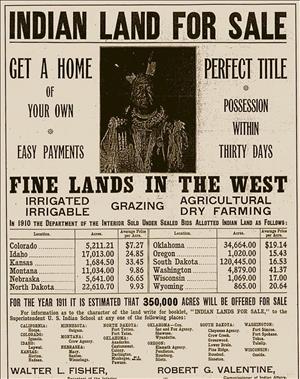On February 8, 1887, the Dawes Severalty Act, also called the Indian Allotment Act, divides Indian reservations among individual tribal members in an effort to assimilate Native Americans into the U.S. population as "responsible farmers." Reservations are divided into 160-acre allotments and assigned to individual members. Unassigned lands are made available to white homesteaders.
Allotment holders were permitted, after 25 years and a certification of competence, to sell their allotments. This resulted in individuals and tribes being swindled out of their property. By 1934, two-thirds of the reservation lands had passed out of tribal control. In Puget Sound, relatively few certificates of competency were issued. The law placed Native Americans on reservations into a special class as wards of the government. Instead of assimilating Native Americans, this law and subsequent government policies prevented them from entering American society as full citizens.
Sources:
"Dawes General Allotment Act," Britannica CD 2000 Deluxe Edition (Encyclopedia Britannica, 2000); "Indian Reorganization Act," Britannica CD 2000 Deluxe Edition (Encyclopedia Britannica, 2000); Alexandra Harmon, Indians in the Making: Ethnic Relations and Indian Identities around Puget Sound (Berkeley: University of California Press, 1998), 162-163.
Licensing: This essay is licensed under a Creative Commons license that
encourages reproduction with attribution. Credit should be given to both
HistoryLink.org and to the author, and sources must be included with any
reproduction. Click the icon for more info. Please note that this
Creative Commons license applies to text only, and not to images. For
more information regarding individual photos or images, please contact
the source noted in the image credit.

Major Support for HistoryLink.org Provided
By:
The State of Washington | Patsy Bullitt Collins
| Paul G. Allen Family Foundation | Museum Of History & Industry
| 4Culture (King County Lodging Tax Revenue) | City of Seattle
| City of Bellevue | City of Tacoma | King County | The Peach
Foundation | Microsoft Corporation, Other Public and Private
Sponsors and Visitors Like You

